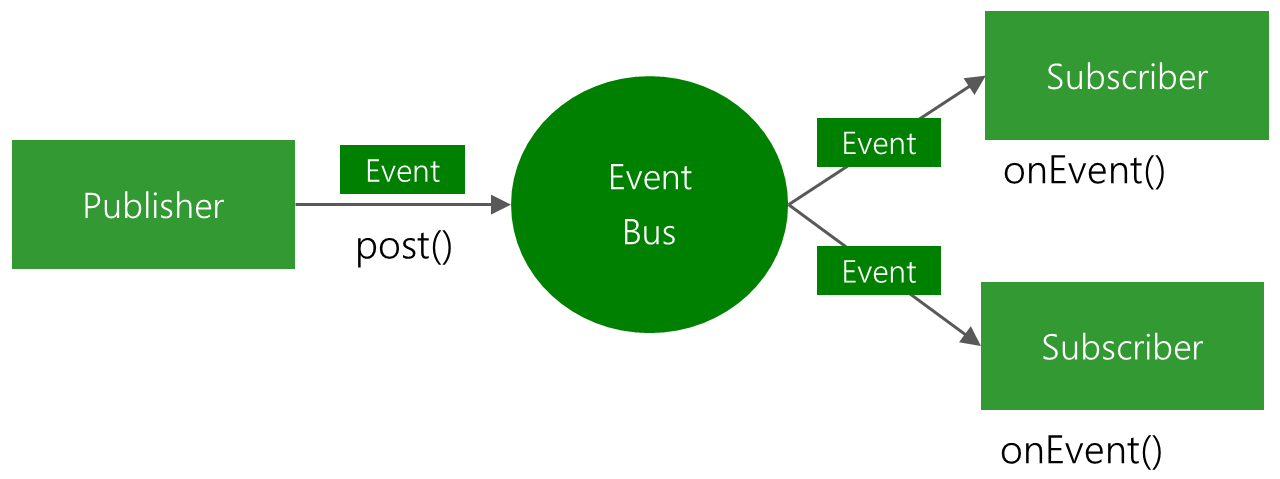안드로이드에는 EventBus라는 라이브러리가 있다. 안드로이드는 Activity와 Fragment와 같이 화면에 종속된 부분이 많고, 때문에 각 Lifecycle이라던지, 고려해줘야 하는 상황들이 있다. 이 때 쓰는 것이 바로 EventBus인데 EventBus는 아래와 같은 구조로 되어있다.

이벤트 버스의 특징은 다음과 같다.
-
simplifies the communication between components
-
decouples event senders and receivers
- performs well with Activities, Fragments, and background threads
- avoids complex and error-prone dependencies and life cycle issues
-
-
makes your code simpler
-
is fast
-
is tiny (~50k jar)
-
is proven in practice by apps with 100,000,000+ installs
-
has advanced features like delivery threads, subscriber priorities, etc.
이러한 이벤트버스를 Rx로 구성한게 Rx버스이다.
RxBus
RxBus 는 라이브러리로도 있지만, 직접 짜는 것도 그리 어렵지 않다. 이벤트 버스의 성질을 잘 생각해보면 주의 해야하는 점은, Hot Observable을 활용해서 등록 및 해지를 활용하면 된다. 각 원하는 이벤트마다 하나의 객체를 만들어서 사용하면 된다.
RxBus 사용
1.이벤트 정의 :
public static class MessageEvent { / * 필요한 경우 추가 필드 * / }
2.가입자 준비 : 구독 방법 선언 및 주석 달기, 선택적으로 스레드 모드 지정 :
@Subscribe ( threadMode = ThreadMode . MAIN )
공공 무효 onMessageEvent ( 된 MessageEvent 이벤트) { / * 무언가 * / };
가입자 등록 및 등록 취소. 예를 들어 Android에서 활동 및 파편은 일반적으로 수명주기에 따라 등록해야합니다.
@Override
public void onStart () {
super . onStart ();
EventBus . 의 getDefault () . 등록 ( this );
}
@Override
public void onStop () {
super . onStop ();
EventBus . 의 getDefault () . 등록 취소 ( this );
}
3.소식 게시 :
EventBus . 의 getDefault () . 게시물 ( 새 MessageEvent ());
다음은 커스텀으로 만들어 본 예제코드이다
이상한 점이 있다면 수정요청을 해라
public class RxEventBus {
private HashMap<Object, List<PublishSubject>> mapsByType = new HashMap<>();
private static volatile RxEventBus instance;
private RxEventBus() {
}
public static RxEventBus getInstance() {
if (instance == null) {
synchronized (RxEventBus.class) {
if (instance == null) {
instance = new RxEventBus();
}
}
}
return instance;
}
public <T> Observable<T> register( Class<T> eventClazz) {
String tag =eventClazz.getSimpleName() ;
List<PublishSubject> subjects = mapsByType.get(tag);
if (subjects == null) {
subjects = new ArrayList<>();
mapsByType.put(tag, subjects);
}
PublishSubject<T> subject = PublishSubject.create();
subjects.add(subject);
return subject;
}
public void unregister(Object tag, Observable observable) {
List<PublishSubject> subjects = mapsByType.get(tag);
if (subjects != null) {
subjects.remove(observable);
if (subjects.isEmpty()) {
mapsByType.remove(tag);
}
}
}
public void post(Object o) {
String tag = o.getClass().getSimpleName();
List<PublishSubject> subjects = mapsByType.get(tag);
if (subjects != null && !subjects.isEmpty()) {
for (Subject s : subjects) {
s.onNext(o);
}
}
}
}
RxEventBus.getInstance().post(new UiEvent.OnUpdateBookmarkStatus());